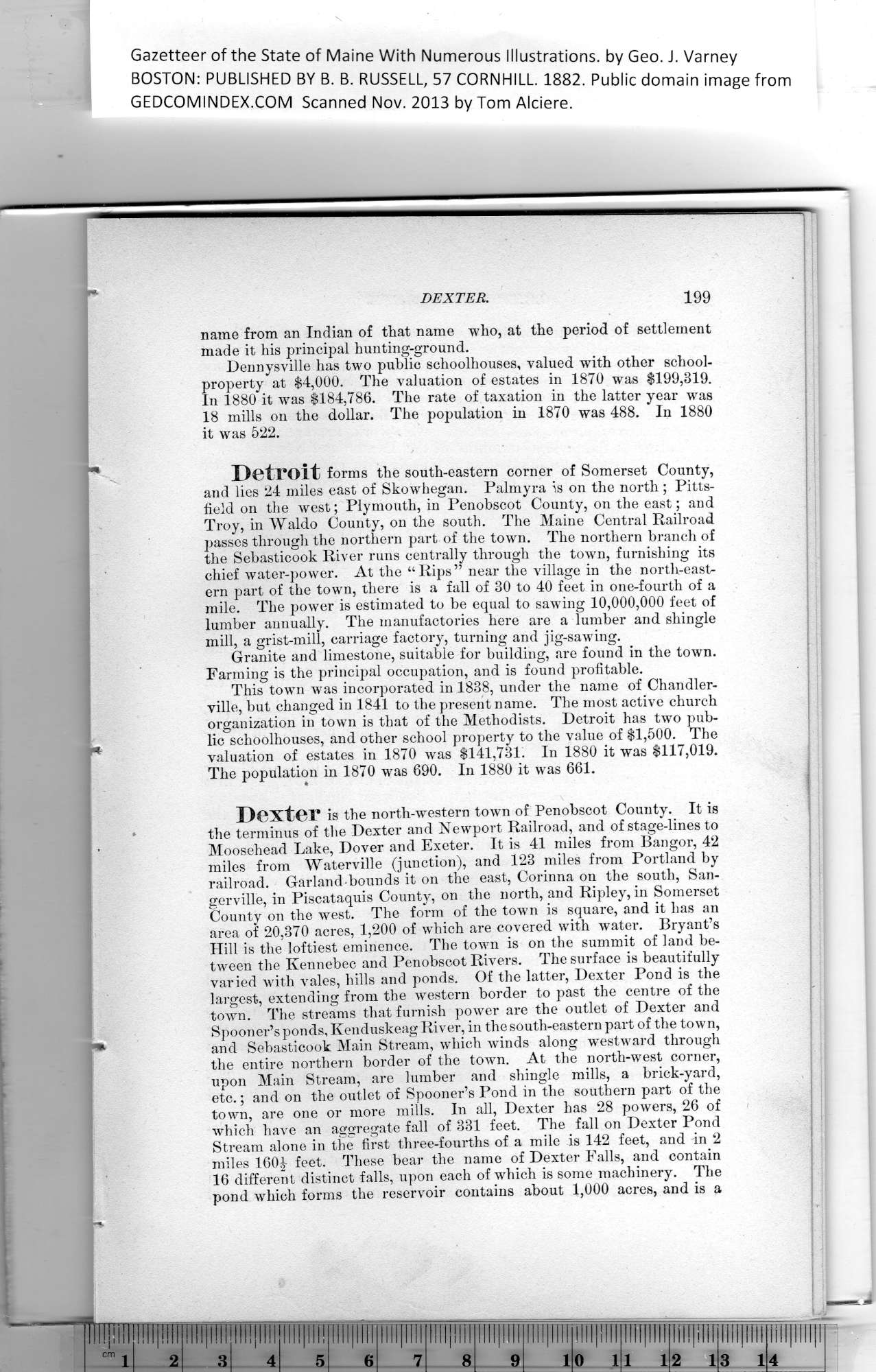|
Gazetteer of the State of Maine With Numerous Illustrations, by Geo. J. Varney
BOSTON. PUBLISHED BY B. B. RUSSELL, 57 CORNHILL. 1882. Public domain image from
DEXTER. 199
name from an Indian of that name who, at the period of settlement
made it his principal hunting-ground.
Dennysville has two public schoolhouses, valued with other school-
property at $4,000. The valuation of estates in 1870 was $199,819.
In 1880 it was $184,786. The rate of taxation in the latter year was
18 mills on the dollar. The population in 1870 was 488. In 1880
it was 522.
Detroit forms the south-eastern corner of Somerset County,
and lies 24 miles east of Skowhegan. Palmyra is on the north ; Pitts-
field on the west; Plymouth, in Penobscot County, on the east; and
Troy, in Waldo County, on the south. The Maine Central Railroad
passes through the northern part of the town. The northern branch of
the Sebasticook River runs centrally through the town, furnishing its
chief water-power. At the “Rips” near the village in the north-east-
ern part of the town, there is a fall of 30 to 40 feet in one-fourth of a
mile. The power is estimated to be equal to sawing 10,000,000 feet of
lumber annually. The manufactories here are a lumber and shingle
mill, a grist-mill, carriage factory, turning and jig-sawing.
Granite and limestone, suitable for building, are found in the town.
Farming is the principal occupation, and is found profitable.
This town was incorporated in 1838, under the name of Chandler-
ville, but changed in 1841 to the present name. The most active church
organization in town is that of the Methodists. Detroit has two pub-
lic schoolhouses, and other school property to the value of $1,500. The
valuation of estates in 1870 was $141,731. In 1880 it was $117,019.
The population in 1870 was 690. In 1880 it was 661.
Dexter is the north-western town of Penobscot County. It is
tbe terminus of the Dexter and Newport Railroad, and of stage-lines to
Moosehead Lake, Dover and Exeter. It is 41 miles from Bangor, 42
miles from Waterville (junction), and 123 miles from Portland by
railroad. Garland bounds it on the east, Corinna on the south, San-
gerville, in Piscataquis County, on the north, and Ripley, in Somerset
County on the west. The form of the town is square, and it has an
area of 20,370 acres, 1,200 of which are covered with water. Bryant’s
Hill is the loftiest eminence. The town is on the summit of land be-
tween the Kennebec and Penobscot Rivers. The surface is beautifully
varied with vales, hills and ponds. Of the latter, Dexter Pond is the
largest, extending from the western border to past the centre of the
town. The streams that furnish power are the outlet of Dexter and
Spooner’s ponds, Kenduskeag River, in the south-eastern part of the town,
and Sebasticook Main Stream, which winds along westward through
the entire northern border of the town. At the north-west corner,
upon Main Stream, are lumber and shingle mills, a briek-yard,
etc.; and on the outlet of Spooner’s Pond in the southern part of tbe
town, are one or more mills. In all, Dexter has 28 powers, 26 of
which have an aggregate fall of 331 feet. The fall on Dexter Pond
Stream alone in the first three-fourths of a mile is 142 feet, and in 2
miles 160^ feet. These bear tbe name of Dexter Falls, and contain
16 different distinct falls, upon each of which is some machinery. Tbe
pond which forms the reservoir contains about 1,000 acres, and is a
PREVIOUS PAGE ... NEXT PAGE
This page was written in HTML using a program written in Python 3.2
|
